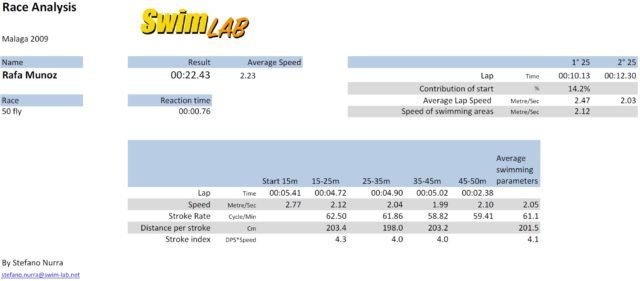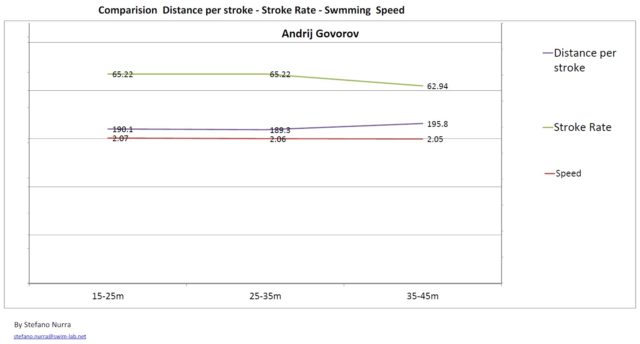With the collaboration of Stefano Nurra, a video analyst and coach for the Turkish Swimming Federation, the Energy Standard Swim Club, and the Austrian Swimming Federation,
Some days ago Andrii Govorov set the world record in Rome in the 50 mt. butterfly.
Previously Rafael Munoz held the record from a swim in a 2009-era “super suit,” no longer allowed under FINA rules.
I had the honor to work with Andrii for a few seasons earlier in his career, and since then we have kept in touch.
I was planning to write an article to emphasize this incredible performance, but … it was very interesting to read the comments posted on some social media. Suddenly everyone turned out to be an advisor, expert in the swimming technique. Advice like “if he improved the underwater phase he could swim faster” or “He is not so powerful, if only he improved his power.”
I was very tempted to reply and explain but in the end I remembered someone once told me ”Don’t feed the troll” so I didn’t. I decided to analyze the performance and to compare it with the previous record, to understand better.
True perfection doesn’t exist…but the “world record” is what gets the closest.
Some considerations
Are Michael Jordan and Shaquille O’Neal alike in every way? And Carl Lewis and Usain Bolt? Or Roger Federer and Rafa Nadal? We can compare the results, the scores, the times, but every single athlete has some peculiar characteristics. Usain Bolt, for example, does not lead the race in the first 20-30 meters, but after this point he is amazing. Someone is stronger at the beginning and someone at the end.
More than any other sport, swimming gives us the possibility to analyze every single split and every single detail: that’s fantastic from a statistic point of view.
We can read every statistic and analysis from two different points of view:
Absolute and Individual.
From the absolute point of view we can analyze the race regardless of the athlete, it is possible to see the proportion and the evolution of the values. We can, also, compare different athletes and performances. Moreover it is possible to define the strengths and the weaknesses of the performance. In order to analyze effectively and subjectively the performance of the swimmer we have to know everything about the athlete. That is, his history, his previous data, and of course the individual characteristics.
Of course, improvements are always possible. If we want to work at the top level we have to be extremely precise and therefore we have to take into consideration the characteristics of every single swimmer.
In the teaching/learning process we need to work above all on the preconditions of the performance keeping in mind that also the best swimmer is always a normal human being, with his strengths and weaknesses.
It is widely believed that the coach can “create” the athlete.
Every trained and professional coach knows that he/she can only bring out what already exists. That means that if we want to give every athlete the opportunity to show his/her power we cannot disregard the “Human Being” behind the athlete.
The two WR analysis
I would like to speak about the video analysis and the biomechanical parameters: these are just data and not personal opinions!
The time of 15m is the only parameter we can apply to analyze all the phases of the start.

Govorov swam 5.24 and Munoz, wearing his “super suit” swam 5.41.
Ok…ok…you are right! In this season we saw two athletes swimming 5.0 in the first 15m, so there are faster in the world.
I’m talking about Caleb Dressel and then Ben Proud in his 50 freestyle and 50 butterfly in Rome. But the time 5.2 is a very good start. Unfortunately the presence of Proud in the same race obscured it.

The Govorov’s measure of breakout is around 11 meters and Munoz’s around 13 meters. The perspective does not allow a precise measurement.
The swimming part of Govorov was amazing, absolutely consistent until 45 meters. Munoz was incredible and faster than Govorov between 15m to 25m. The time of the first 25m for Govorv was 10.08 and for Munoz was 10.13. Between the 25m to the 35m and the 35m to the 45m Govorov was faster than Munoz.

Govorov showed an incredible ability to swim with a very high stroke rate, keeping a good distance per stroke.
The final part was amazing. Govorov lost his stroke rate. Maybe he was tired while Munoz speeded up.


In the final part we do not take into consideration the speed of the body but the speed required to swim the last 5m.
This is the time is taken from the head to the moment the hand touches the wall. The speed is surely higher.
.Last but not least I think that Govorov can find it easier to improve in the last part of the race than at the start. Don’t forget that we are speaking about a world record and that the previous one was set nine years ago.

Could the slow down in tempo the last 5 meters be contributed to him setting up for a well timed finish?
Very possible, and interesting thought. I’d love to have an elite swimmer for a day in a pool and see what impact ‘timing up a finish’ makes. In theory, the improved time as a result of lining up his finish should off-set any slow-down. If it doesn’t…whoops!
By the way off topic but I’ve found this week the race video of the men’s 4X100 free relay in Rio UNDERWATER!
And that’s awesome to watch.
Still no “normal” video of the race posted almost 2 years later…. Don’t tell me it’s NBC…. Some finals are posted on youtube.
https://www.youtube.com/watch?v=eOjloDn8spI
Here’s again the race video of that WR.
https://www.youtube.com/watch?v=9fuvuBB0x0s
I like that kind of articles. Technical but understandable for the non specialist like me.
Professional and technical article. WELL DONE STEFANO
Congratulations to Andrii and to his coach (Arilson Silva), who has been coaching him for the last 2 years (at least), and has been developing him consistently since they started to work together.